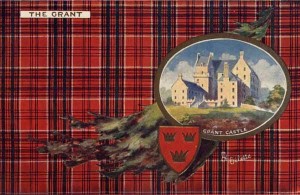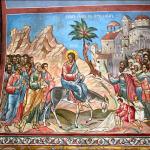 Continued from yesterday.
Continued from yesterday.
A tempest of Winters temper—mine—had blown through the Highlands of Scotland on our harried, hurried itinerary, and I pondered that now in Ireland. My working notion of a “roots” trip up until that point pertained only in the genealogical sense: Scotland and Ireland being, respectively, my maternal and paternal ancestral stomping grounds.
But in my review of the course on spiritual hearing I’d begun the month prior, a most delicious linguistic epiphany was about to present itself like low-hanging fruit.
As opposed to those cerebral terms for some ugly manifestations in me—weaknesses, patterns, compulsions, dysfunctions—which lacked the texture and energy of the issues I needed to confront, I revisited in the course manual the notion of spiritual fruit.
As explicated by St. Paul in his Letter to the Galatians, the nine fruits of the Spirit are: love, joy, peace, patience, kindness, goodness, faithfulness, gentleness, and self-control.
If you want to take an honest accounting of your produce in this department, take a road trip with your spouse and kids in another country. You might find yourself in many a moment, as I did, not much stronger than the dollar in the face of all that taxes you.
You might find yourself, as I did, thinking of another quote from St. Paul in his Letter to the Romans: “I do not understand my own actions. For I do not do what I want, but I do the very thing I hate…. I can will what is right, but I cannot do it…. Wretched man that I am, who will deliver me from this body of death?”
Admittedly, it isn’t fair or accurate of me to slight, linguistically speaking, the therapeutic terminology of weaknesses, patterns, compulsions, and dysfunctions in favor of a spiritual term like fruits, since the former are related more precisely to the roots that yield all the opposite fruits of the Spirit.
It isn’t accurate in another sense as well, in that I myself have benefitted greatly from therapy—but fortunately with someone who has equal footing in things spiritual as in those analytical.
As the course manual states with axiomatic effect, “Unholy roots produce unholy fruit.” I tend to rephrase this as “dark roots yield dark fruits” for monosyllabic impact, and the visual note that augments the sensory engagement already in play. But either way, the meaning is the same.
All of that said, the lesson on spiritual fruit was hardly low-hanging compared to the lesson on strongholds that grabbed hold of me body, soul, and spirit in my review.
Again, St. Paul, who uses the term in his Second Letter to the Corinthians:
“For the weapons of our warfare are not carnal but mighty in God for pulling down strongholds, casting down arguments and every high thing that exalts itself against the knowledge of God, bringing every thought into captivity to the obedience of Christ.”
Casting down arguments? Nope, I was more inclined to raise them up at certain moments in the car with my wife and kids—like when we got lost and missed the last ferry from mainland Scotland to the Isle of Mull, thus forced to eat the cost of our first night at the B&B on Mull. But I was driving, not navigating, so it wasn’t my effing fault. At All! (Other details to the contrary.)
Self-exaltation? Yup. See above.
Every thought captive to the obedience of Christ? In the fracas above and its aftermath? Let’s not go there.
This verse from Second Corinthians was a familiar enough bit of scripture, even if I had never fully grasped it as I then did with two exegetical points in the course notes:
The first one being that the original Greek indicates that to pull down strongholds means to demolish them with violence.
The second one being the delicious epiphany waiting for me to pluck it from the vine—in the original Greek, the word for stronghold means a castle or fortress from which one argues over one’s possessions.
Wait. What? Castles?
Possessions in the spiritual sense meaning things like opinions and vain imaginations. Like self-exaltations and rebellious thoughts.
Suddenly there seemed to be a deeper meaning behind this “roots” trip first to Scotland and now Ireland, vis-à-vis the chance to see as if for the first time those old strongholds, those castles deep within me, and orchards that have for too long yielded an overabundance of unhealthy fruit.
Looking back at From Kittery to Kansas in light of these revelations, their vernacular truth was right there on the page, having escaped me over the course of previous reads:
“One of the principal strongholds of the Grants was Urquhart Castle located on the shores of Loch Ness.”
“Castle Grant was built on the site of an ancient Scottish stronghold. (Today, sadly, it is near ruin and decay.)”
So there were, and here are, the true castles of my inheritance, opposed to the ones that had escaped me in the historical sense and which I bemoaned on that imaginary T-shirt:
My Ancestors Lived in Castles in Scotland and All I Got Was a Cul-de-Sac in Scottsdale.
To the contrary, I got a host of strongholds; and it would do me well to do away with them in the manner that St. Paul exhorted.
This will be a roots trip, alright, as long as I am up to the task, and the battle, and the knowledge that the battle is already won for the peace that passes all understanding.
To that point, I should get myself a T-shirt perhaps only visible in the invisible realm:
My King Went to Calvary on My Behalf and I Got All Nine Fruits of The Spirit Plus a Kingdom That Lasts Forever.
In the meantime, I’ll wear in spirit the Clan Grant motto that I wore on a pin fastened to the kilt at my wedding:
Stand Fast.
Bradford Winters is a screenwriter/producer in television whose work has included such series as Oz, Kings, Boss, and The Americans. His poems have appeared in Sewanee Theological Review, Spoon River Poetry Review, and Georgetown Review, among other journals. He lives in Brooklyn with his wife and three children.















